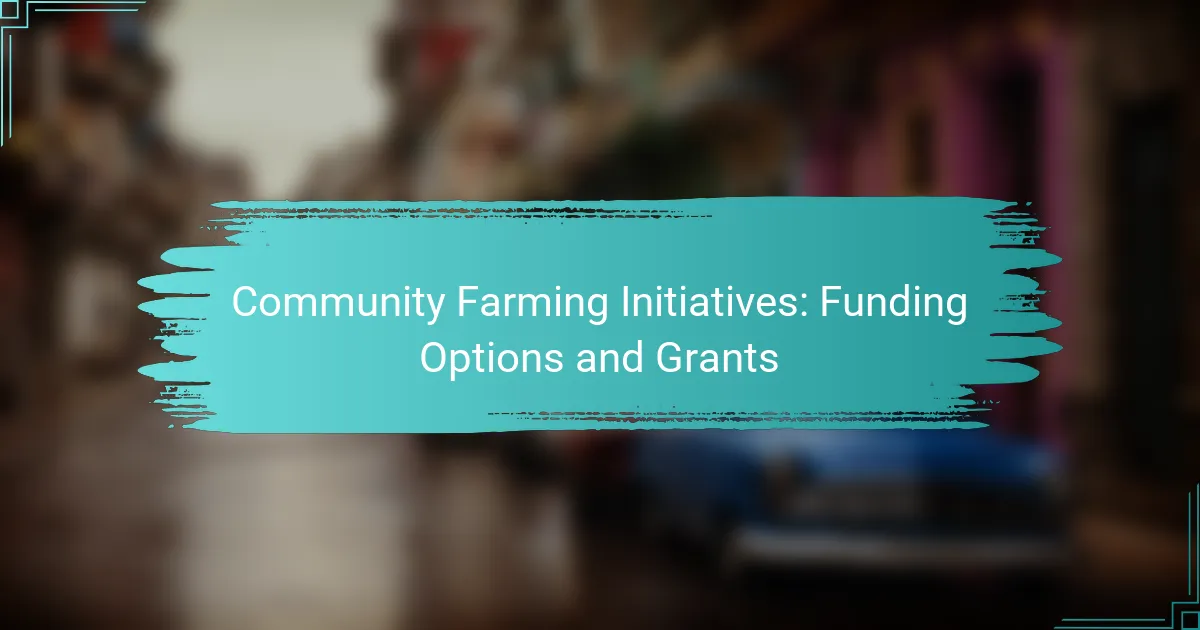Community farming initiatives play a vital role in promoting sustainable agriculture and enhancing local food systems. To support these efforts, various funding options are available, including government grants, local programs, and private foundations. Understanding the specific eligibility criteria and application processes for these grants is crucial for organizations seeking to maximize their impact within the community.
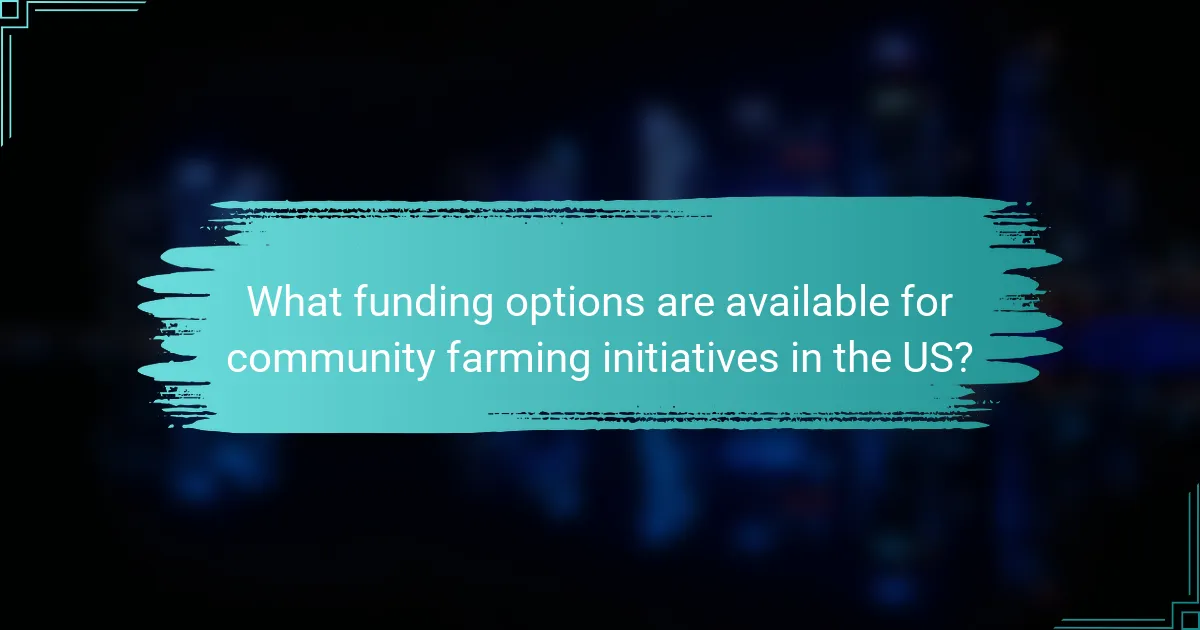
What funding options are available for community farming initiatives in the US?
Community farming initiatives in the US can access various funding options, including government grants, local programs, private foundations, and crowdfunding. Each option has unique requirements and benefits, making it essential for organizations to evaluate what best suits their needs.
USDA Community Food Projects Grant Program
The USDA Community Food Projects Grant Program provides funding to support food security initiatives in low-income communities. Grants typically range from $10,000 to $400,000 and can be used for a variety of purposes, including project planning, implementation, and evaluation.
To apply, organizations must demonstrate a strong community need and outline how their project will enhance food access and sustainability. It is crucial to meet the application deadlines and provide detailed budgets and project plans to improve chances of funding.
Local Government Grants
Local governments often offer grants to promote community agriculture and food systems. These grants can vary widely in amount and eligibility criteria, depending on the municipality’s budget and priorities.
Organizations should research their local government’s website or contact relevant departments to find available grants. Engaging with local officials can also provide insights into upcoming funding opportunities and specific community needs that align with grant objectives.
Private Foundation Funding
Many private foundations support community farming initiatives through grants and donations. These foundations often focus on specific issues such as food justice, environmental sustainability, or health and nutrition.
To secure funding, organizations should identify foundations that align with their mission and goals. Crafting a compelling proposal that clearly outlines the project’s impact, sustainability, and community involvement is essential for success.
Crowdfunding Platforms
Crowdfunding platforms allow community farming initiatives to raise funds directly from individuals who support their mission. Popular platforms like Kickstarter, GoFundMe, and Indiegogo can help organizations reach a broader audience.
Successful crowdfunding campaigns typically require a well-defined project, engaging storytelling, and effective marketing strategies. Setting a realistic funding goal and offering rewards or incentives can motivate potential backers to contribute.
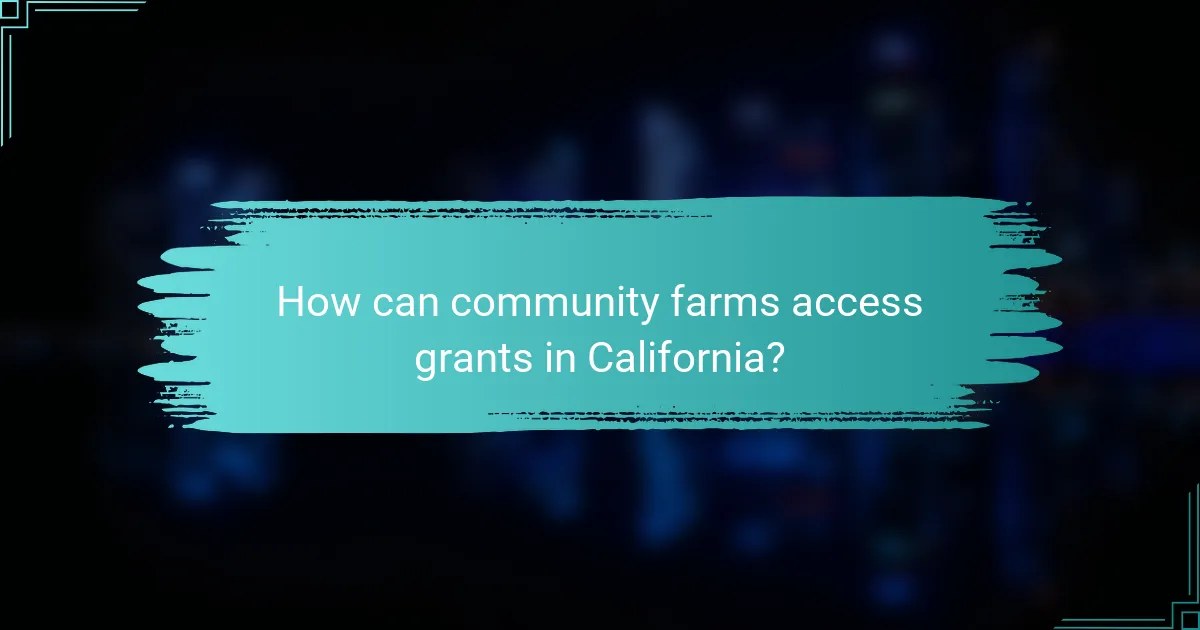
How can community farms access grants in California?
Community farms in California can access grants through various state and local programs designed to support agricultural initiatives. These funding opportunities often require applications that outline the farm’s goals, community impact, and financial needs.
California Department of Food and Agriculture Grants
The California Department of Food and Agriculture (CDFA) offers several grant programs aimed at enhancing agricultural practices and community engagement. Programs like the Specialty Crop Block Grant Program provide funding for projects that promote specialty crops, while the Sustainable Agricultural Lands Conservation Program supports efforts to protect agricultural land.
To apply for these grants, community farms should prepare a detailed proposal that includes project objectives, budget estimates, and anticipated outcomes. It’s crucial to adhere to application deadlines and guidelines, which can vary by program.
Local Nonprofit Partnerships
Partnering with local nonprofits can be an effective way for community farms to secure funding and resources. Many nonprofits focus on agricultural sustainability, food security, or community development and may offer grants or assistance in applying for larger funding opportunities.
Community farms should research local organizations that align with their mission and explore potential collaborations. Engaging with these nonprofits can also provide access to workshops, networking events, and additional resources that enhance the farm’s visibility and impact.
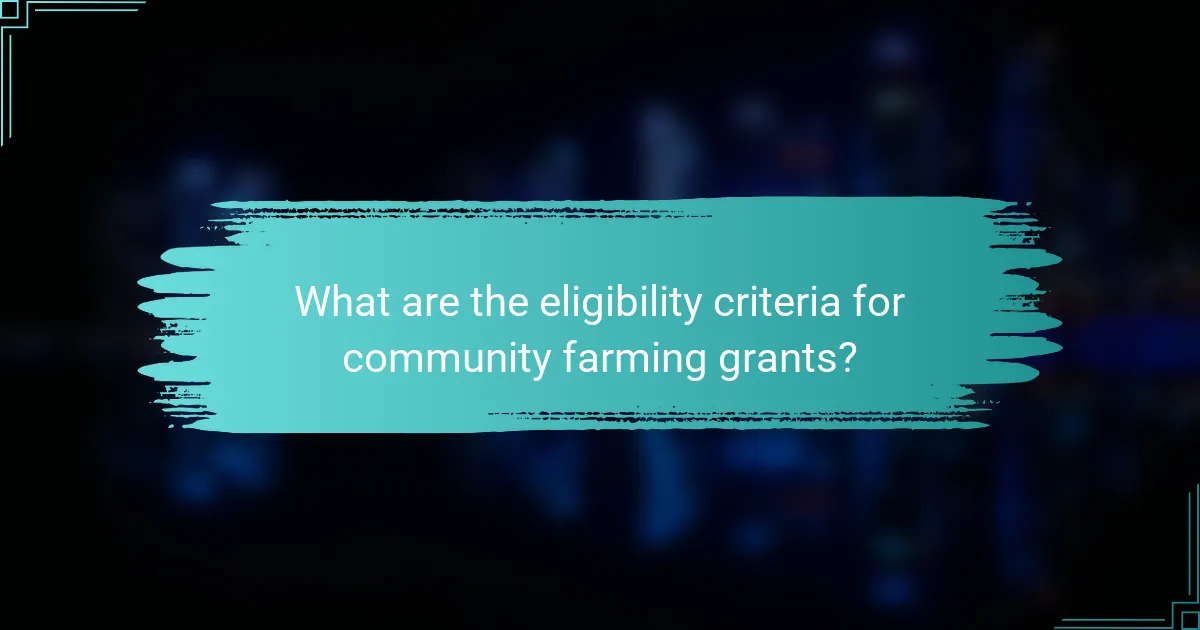
What are the eligibility criteria for community farming grants?
Eligibility criteria for community farming grants typically include nonprofit status, project sustainability plans, and alignment with local agricultural goals. Organizations must demonstrate how their initiatives will benefit the community and contribute to sustainable farming practices.
Nonprofit Status Requirements
Most community farming grants require applicants to have a recognized nonprofit status, which can be achieved by registering as a 501(c)(3) organization in the United States or its equivalent in other countries. This status not only legitimizes the organization but also allows it to receive tax-deductible donations.
In some cases, informal groups may partner with established nonprofits to qualify for grants. This collaboration can enhance credibility and provide access to additional resources and expertise.
Project Sustainability Plans
A strong sustainability plan is crucial for securing funding. Applicants should outline how their farming initiatives will remain viable long-term, including strategies for financial stability, environmental impact, and community engagement. This may involve diversifying income sources through workshops, produce sales, or grants.
Including specific metrics to measure success, such as increased crop yields or community participation rates, can strengthen the proposal. Funders often look for projects that not only address immediate needs but also contribute to lasting community benefits.

How do community farms apply for funding?
Community farms can apply for funding through various grants and financial programs designed to support agricultural initiatives. The process typically involves submitting an application that outlines the farm’s goals, budget, and community impact.
Application Process Overview
The application process for community farm funding generally starts with identifying suitable grants from government agencies, non-profits, or private organizations. Each funding source may have specific eligibility criteria and deadlines, so thorough research is essential.
Once a grant is identified, applicants usually need to complete a detailed application form, which may require a project proposal, budget estimates, and timelines. It’s advisable to start the application well in advance of the deadline to accommodate any revisions or additional requirements.
Required Documentation
Documentation requirements can vary significantly depending on the funding source. Commonly required documents include a project description, a detailed budget, proof of community support, and financial statements from the farm.
Some grants may also ask for letters of recommendation or evidence of previous successful projects. To streamline the process, create a checklist of required documents and gather them early to avoid last-minute complications.

What are the common challenges in securing funding?
Securing funding for community farming initiatives often presents several challenges that can hinder progress. Key obstacles include competition for limited resources and complex application procedures that can deter potential applicants.
Competition for Limited Resources
Many community farming initiatives compete for a finite pool of funding, which can make it difficult to secure necessary financial support. Grants and funding opportunities are often oversubscribed, leading to a highly competitive environment.
To improve chances of success, initiatives should clearly demonstrate their unique value and impact. Highlighting community benefits, sustainability practices, and innovative approaches can help differentiate proposals from others vying for the same funds.
Complex Application Procedures
Navigating the application processes for grants can be daunting due to their complexity and specific requirements. Many funding sources require detailed proposals, budgets, and supporting documentation, which can overwhelm applicants, especially those with limited experience.
To tackle this challenge, organizations should invest time in understanding the guidelines of each funding source. Creating a checklist of required documents and deadlines can streamline the application process and increase the likelihood of successful submissions.
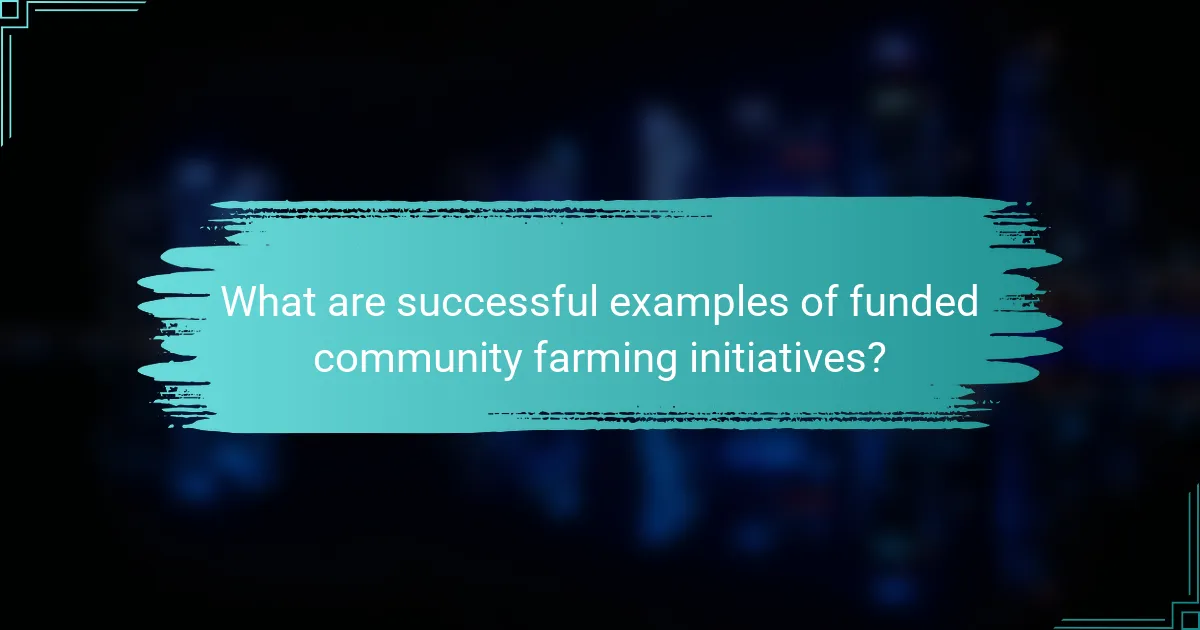
What are successful examples of funded community farming initiatives?
Successful funded community farming initiatives often combine local resources with grant support to create sustainable agricultural practices. These projects not only enhance food security but also foster community engagement and environmental stewardship.
Urban Roots in Austin, Texas
Urban Roots is a nonprofit organization that transforms vacant lots into productive urban farms in Austin. They focus on youth development through agriculture, providing job training and leadership opportunities for local teens. Funding from various grants allows them to maintain operations and expand their educational programs.
The initiative emphasizes community involvement and sustainability, often partnering with local schools and organizations to promote healthy eating and environmental awareness. Their model showcases how targeted funding can empower youth while addressing food deserts in urban areas.
Greensgrow Farms in Philadelphia, Pennsylvania
Greensgrow Farms operates as an urban farm and community hub in Philadelphia, utilizing grant funding to support local food production and education. They offer a variety of programs, including workshops on sustainable farming practices and a community-supported agriculture (CSA) program that connects residents with fresh produce.
This initiative highlights the importance of community engagement in urban agriculture. By providing access to fresh food and educational resources, Greensgrow Farms not only improves local food systems but also strengthens community ties. Their success illustrates how effective funding can lead to lasting positive impacts in urban environments.
